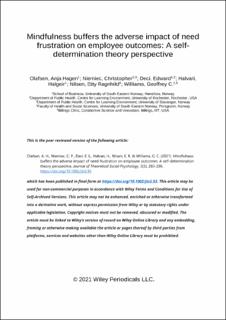Mindfulness buffers the adverse impact of need frustration on employee outcomes: A self‐determination theory perspective
Olafsen, Anja Hagen; Niemiec, Christopher; Deci, Edward; Halvari, Halgeir; Nilsen, Etty Ragnhild; Williams, Geoffrey C.
Peer reviewed, Journal article
Accepted version
Permanent lenke
https://hdl.handle.net/11250/3039240Utgivelsesdato
2021Metadata
Vis full innførselSamlinger
Originalversjon
Olafsen, A. H., Niemiec, C. P., Deci, E. L., Halvari, H., Nilsen, E. R. & Williams, G. C. (2021). Mindfulness buffers the adverse impact of need frustration on employee outcomes: A self-determination theory perspective. Journal of Theoretical Social Psychology, 5(3), 283-296. https://doi.org/10.1002/jts5.93Sammendrag
According to the job demands–resources model, job demands (or hindrances) can drain energy and yield physiological and psychological costs by requiring sustained physical and/or mental effort at work. Using self-determination theory, the current study examined the associations among role conflict (as a proxy for job demands), frustration of the basic psychological needs for autonomy, competence, and relatedness, mindfulness, and employees’ health and work-related functioning. In line with hypotheses, the results revealed an indirect effect of role conflict on burnout, somatic symptom burden, and turnover intentions through basic psychological need frustration. Further, these indirect effects were moderated by mindfulness, such that the mediation by basic psychological need frustration was less evident among individuals who reported higher levels of mindfulness. Taken together, these findings contribute to a small but growing literature on the benefits of mindfulness in organizational settings.
